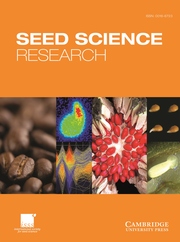Crossref Citations
This article has been cited by the following publications. This list is generated based on data provided by
Crossref.
Peralta-García, Cynthia
Sánchez-Coronado, María Esther
Orozco-Segovia, Alma
Orozco-Segovia, Susana
and
Pisanty-Baruch, Irene
2016.
Germination of four riparian species in a disturbed semi-arid ecosystem.
South African Journal of Botany,
Vol. 106,
Issue. ,
p.
110.
Sánchez, Ana M.
Alonso-Valiente, Patricia
Albert, M. José
and
Escudero, Adrián
2017.
How might edaphic specialists in gypsum islands respond to climate change? Reciprocal sowing experiment to infer local adaptation and phenotypic plasticity.
Annals of Botany,
Vol. 120,
Issue. 1,
p.
135.
Tavili, Ali
Jafari, Mohammad
Chahouki, Mohammad Ali Zare
and
Sohrabi, Mohammad
2017.
How do Cryptogams Affect Vascular Plant Establishment?.
Cryptogamie, Bryologie,
Vol. 38,
Issue. 3,
p.
313.
Alarcón, R.
Hernández-Plaza, E.
Navarrete, L.
Sánchez, M.J.
Escudero, A.
Hernanz, J.L.
Sánchez-Giron, V.
and
Sánchez, A.M.
2018.
Effects of no-tillage and non-inversion tillage on weed community diversity and crop yield over nine years in a Mediterranean cereal-legume cropland.
Soil and Tillage Research,
Vol. 179,
Issue. ,
p.
54.
Luzuriaga, Arantzazu L.
Sánchez, Ana M.
López-Angulo, Jesús
and
Escudero, Adrián
2018.
Habitat fragmentation determines diversity of annual plant communities at landscape and fine spatial scales.
Basic and Applied Ecology,
Vol. 29,
Issue. ,
p.
12.
Chamorro, Daniel
Luna, Belén
and
Moreno, José M.
2018.
Local climate controls among-population variation in germination patterns in twoEricaspecies across western Iberia.
Seed Science Research,
Vol. 28,
Issue. 2,
p.
112.
Pescador, David S
Sánchez, Ana M
Luzuriaga, Arantzazu L
Sierra-Almeida, Angela
and
Escudero, Adrián
2018.
Winter is coming: plant freezing resistance as a key functional trait for the assembly of annual Mediterranean communities.
Annals of Botany,
Vol. 121,
Issue. 2,
p.
335.
Duncan, Corrine
Schultz, Nick L
Good, Megan K
Lewandrowski, Wolfgang
Cook, Simon
and
Pugnaire, Francisco
2019.
The risk-takers and -avoiders: germination sensitivity to water stress in an arid zone with unpredictable rainfall.
AoB PLANTS,
Vol. 11,
Issue. 6,
Alarcón Víllora, R.
Hernández Plaza, E.
Navarrete, L.
Sánchez, M.J.
and
Sánchez, A.M.
2019.
Climate and tillage system drive weed communities’ functional diversity in a Mediterranean cereal-legume rotation.
Agriculture, Ecosystems & Environment,
Vol. 283,
Issue. ,
p.
106574.
Frischie, S.
Fernández‐Pascual, E.
Ramirez, C. G.
Toorop, P.
González, M. H.
Jiménez‐Alfaro, B.
and
Pritchard, H.
2019.
Hydrothermal thresholds for seed germination in winter annual forbs from old‐field Mediterranean landscapes.
Plant Biology,
Vol. 21,
Issue. 3,
p.
449.
Lorite, Juan
Agea, Daniel
García‐Robles, Helena
Cañadas, Eva M.
Rams, Susana
and
Sánchez‐Castillo, Pedro
2020.
Plant recovery techniques do not ensure biological soil‐crust recovery after gypsum quarrying: a call for active restoration.
Restoration Ecology,
Vol. 28,
Issue. S2,
Madrigal‐González, Jaime
Cano‐Barbacil, Carlos
Kigel, Jaime
Ferrandis, Pablo
Luzuriaga, Arantzazu L.
and
Michalet, Richard
2020.
Nurse plants promote taxonomic and functional diversity in an arid Mediterranean annual plant community.
Journal of Vegetation Science,
Vol. 31,
Issue. 4,
p.
658.
Lorite, Juan
Ballesteros, Miguel
García-Robles, Helena
and
Cañadas, Eva M.
2021.
Economic evaluation of ecological restoration options in gypsum habitats after mining.
Journal for Nature Conservation,
Vol. 59,
Issue. ,
p.
125935.
Vargas-Colin, Alexa
Flores, Joel
Romo-Campos, Rosa
Douterlungne, David
Yáñez-Espinosa, Laura
González, José M.
and
Luzuriaga, Arantzazu L.
2022.
Changes in rainfall amount and seasonality modulate taxonomic, functional, and phylogenetic diversity in a gypsophilous plant community in the Chihuahuan Desert.
Plant Ecology & Diversity,
Vol. 15,
Issue. 5-6,
p.
265.
Heiden, Nathaniel
Cera, Andreu
and
Palacio, Sara
2022.
Do soil features condition seed germination of gypsophiles and gypsovags? An analysis of the effect of natural soils along an alkalinity gradient.
Journal of Arid Environments,
Vol. 196,
Issue. ,
p.
104638.
Mhlanga, Blessing
Ercoli, Laura
Thierfelder, Christian
and
Pellegrino, Elisa
2022.
Conservation agriculture practices lead to diverse weed communities and higher maize grain yield in Southern Africa.
Field Crops Research,
Vol. 289,
Issue. ,
p.
108724.
Sánchez, Ana M.
Peralta, Ana M. L.
Luzuriaga, Arantzazu L.
Prieto, María
and
Escudero, Adrián
2022.
Climate change and biocrust disturbance synergistically decreased taxonomic, functional and phylogenetic diversity in annual communities on gypsiferous soils.
Oikos,
Vol. 2022,
Issue. 3,
López‐Rubio, Roberto
Pescador, David S.
Escudero, Adrián
and
Sánchez, Ana M.
2022.
Rainy years counteract negative effects of drought on taxonomic, functional and phylogenetic diversity: Resilience in annual plant communities.
Journal of Ecology,
Vol. 110,
Issue. 10,
p.
2308.
Lamont, Byron B.
Burrows, Geoffrey E.
and
Korczynskyj, Dylan
2022.
High summer temperatures do not interact with fire to promote germination among seeds of Cistaceae: a reinterpretation of Luna (2020) with extra data on wet/dry conditions*.
Plant Ecology,
Vol. 223,
Issue. 2,
p.
141.
Madrigal‐González, Jaime
Luzuriaga, Arantzazu L.
Escudero, Adrián
Ferrandis, Pablo
and
Calatayud, Joaquín
2023.
Warming reverses directionality in the richness–abundance relationship in ephemeral Mediterranean plant communities.
Ecology,
Vol. 104,
Issue. 1,



